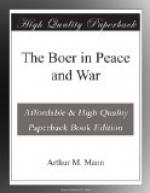The Boers are a pastoral people—one can hardly say an agricultural people. They have been that sort of people from the start, and they will never change. They are used to waggons and oxen and sheep, and the waggons and oxen and sheep have got quite used to them. There is abundance of proof in the Dutch Republics to satisfy any ordinary person that a Boer, no matter if he can count his sovereigns by the million, would never dream of giving up his farm and turning country gentleman. He may take no part in the actual work (and this is not much in his line under any circumstances), but he exercises that amount of careful supervision necessary to successful farming, and continues to do so until the end. Even the members of the Volksraad, who are usually well-to-do farmers, never neglect their crops, albeit a handsome income is assured in their official capacity.
But does farming in the Dutch Republics pay? Most emphatically, No. I am not making this assertion because I have tried it myself, I am simply quoting the dictum of every Boer. I have been careful to obtain a consensus of opinion on this question for the guidance of those who may contemplate embarking upon such an unsatisfactory and dangerous undertaking. Farming does not pay. For my own satisfaction, I recently questioned a Boer with regard to his average yearly income, and he was good enough to humour me.
The value of his stock worked out as follows:
1,000 sheep say
L 500
100 head of cattle " 1000
48 horses " 480
-----
L1980
-----
L
s. d.
His yearly clip averaged 10 bales @ L10 = 100
0 0
On an average he sold:
20 head of cattle " L 8
= 160 0 0
10 horses " L10
= 100 0 0
Butter, 1,000 pounds " 1s.
= 50 0 0
Hides and skin
say 5 0 0
Horns
" 1 0 0
Mealies, 60 bags " 12s.
= 36 0 0
Forage, 5,000 bundles " 3d.
= 62 10 0
Kaffir corn, 30 bags " 15s.
= 22 10 0
-----------
Total average yearly income L537
0 0
-----------
It must not be supposed for one moment that here we have a rich man. I am merely citing the case of a farmer who said to me: ’I’d rather be a book-keeper at twenty-pounds a month.’ He had no idea that his annual income figured up to anything like L537. And yet that same man would endeavour to make a good bargain in purchasing sixpennyworth of hairpins because he considered himself a ‘poor man.’




